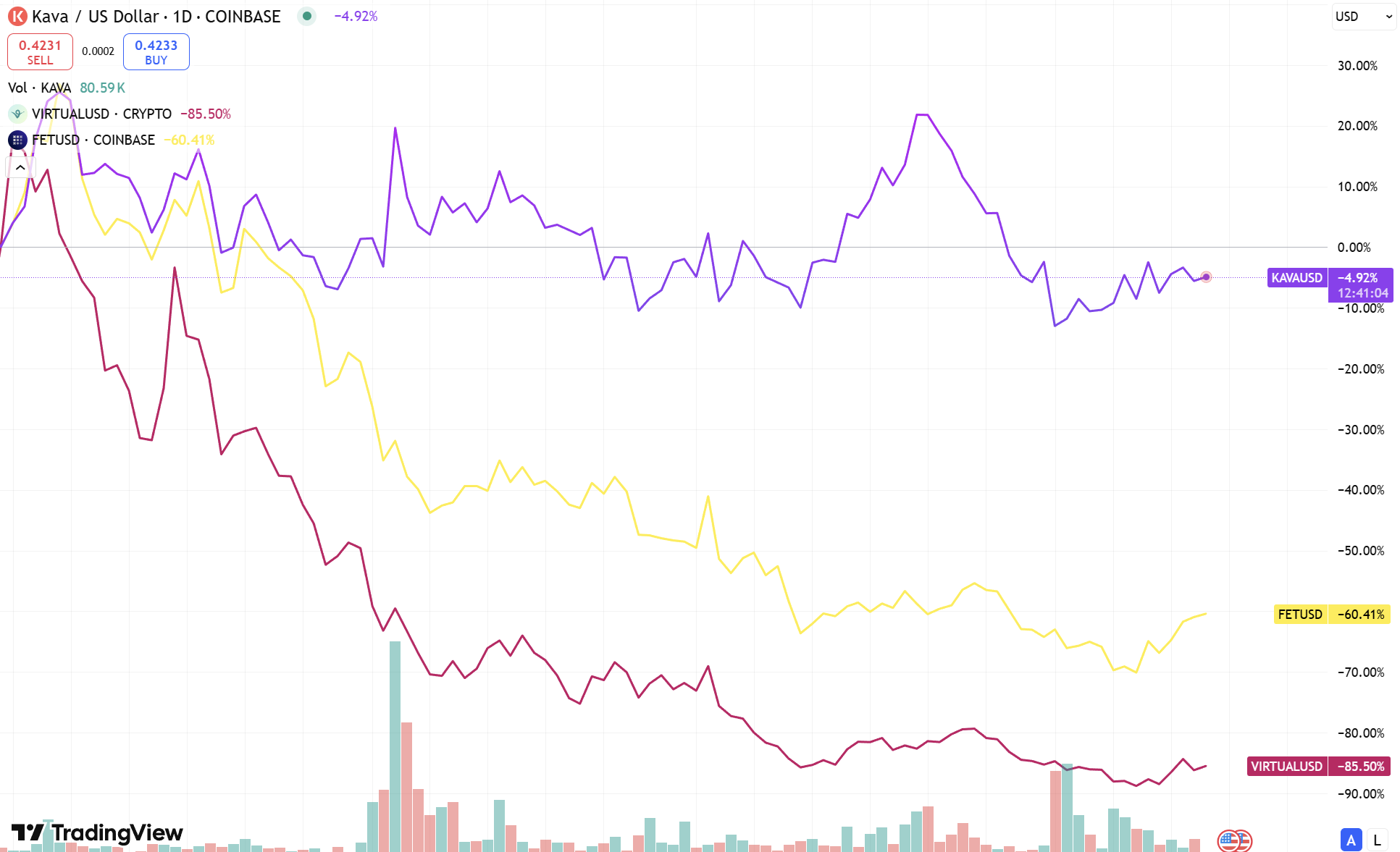Tech, Kava, Artificial Intelligence, decentralized AI Kava’s co-founder explains why the DeFi-to-AI pivot helped it beat the market, whereas different AI tokens have flopped.
Artificial Intelligence tokens have long-term endurance and will not be one other crypto fad like non-fungible tokens (NFTs), despite the fact that the business has already seen its share of flops, Kava Labs co-founder Scott Stuart stated in an interview with CoinDesk.
“We had this first AI wave, but that wave was projects like Fetch saying, ‘We’re going to do a merger,’ but producing nothing from it, or projects like Virtuals or AI16z, initially doing well, then dropping off by 80% or 90%. It was an unhappy outcome,” Stuart instructed CoinDesk in an interview.

Market information reveals that since January, Virtuals, the native token of the AI-related Virtuals Protocol, is down almost 85%. FET, the token of Fetch.ai, the bogus intelligence alliance, is down 60%.
KAVA, for its half, is fairing moderately effectively, down 5%, beating the CoinDesk 20, a market index, which is down 29%.
Kava did not begin as an AI mission. Initially recognized for Cosmos-based decentralized finance (DeFi), started as simply one other DeFi mission, however pivoted to decentralized AI as a differentiator amidst ongoing crypto market consolidation.
Since its pivot, Kava has shipped its Kava AI platform and market, a blockchain-native chatbot resembling ChatGPT powered by DeepSeek’s R1 giant language mannequin, the autonomous AI agent Oros, and decentralized GPU infrastructure.
Stuart stated this pivot was vital as a result of altcoins face elevated challenges with out a compelling narrative, making decentralized AI’s readability and worth proposition vital.
“Unlike speculative bubbles such as NFTs, decentralized AI’s fundamental utility ensures its resilience. NFTs or similar trends are essentially memes built on top of memes. Anything that’s beta to meme coins will inevitably rise and fall with hype cycles,” he stated.
The firm is constructing a decentralized synthetic intelligence (AI) infrastructure designed to be auditable, clear, and open-source. Given its efficiency in comparison with the remainder of the market, clearly, they’re onto one thing.
“When you look at AI as a technology, it’s just another way for corporations to present you information,” Stuart said. “With OpenAI, there’s a secret sauce component, and at any point in the future, they can tweak that model to serve you what they want.”
Stuart argues that the stakes are substantial in separating AI from this black field as expertise turns into more and more integral to every day life.
“Closed-source AI can tweak models in ways you can’t see. You don’t know if it’s optimized for your benefit or a company’s or even a nation-state’s interest,” he stated.
And he is not the one one which has these issues. In an earlier interview with CoinDesk, Simon Kim, CEO of South Korea’s Hashed, the nation’s main web3 fund, stated closed-source AI has made a ‘God’ from a machine. Its internal workings stay unknown and incomprehensible, nevertheless it has established itself as a pillar of society.
In distinction, Kava Labs promotes an “open-weight” method, permitting anybody to confirm AI mannequin parameters, very similar to Ethereum’s clear good contracts.
Recognizing how regulators more and more view AI transparency as a strategic U.S. curiosity, Stuart sees a chance to construct decentralized AI infrastructure that is certifiably ‘made-in-the-U.S.A.’ and backed by open-source funding initiatives.
“During the last administration, the trend was toward offshoring everything,” he stated. “Now it seems they’re serious about reversing that, and we’re using this shift as an opportunity to strengthen U.S.-based infrastructure.”
And beneath this infrastructure shall be open supply expertise.
“The future of AI isn’t corporate-controlled,” he concluded. “It’s open, transparent, and decentralized. Kava aims to lead this transformation.”
CoinDesk: Bitcoin, Ethereum, Crypto News and Price Data Read More
